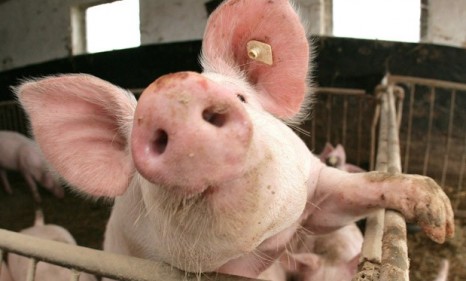Lab-grown meat: A solution to global warming?
A new study finds that growing meat in a lab rather than slaughtering actual animals would slash greenhouse gas emissions — and taste just as good

A free daily email with the biggest news stories of the day – and the best features from TheWeek.com
You are now subscribed
Your newsletter sign-up was successful
Raising animals to become food takes a serious toll on the environment, but there's a great solution for green-minded omnivores, say researchers at Oxford and Amsterdam University: Meat grown artificially in labs. Synthetic meat, like that cultivated using the bacterium Cyanobacteria hydrolysate, would drastically reduce greenhouse gas emissions, and help provide protein to the world's increasingly meat-eating populations, the researchers say. Is this a good solution, or even a realistic one? Here, a brief guide:
How exactly does lab-grown meat save the environment?
Factory farms and other conventional ways of raising livestock for food are responsible for about 18 percent of greenhouse gas emissions — more than the world's airplanes and cars combined. Cows, sheep, and hogs require energy and land to grow, and they pollute the air, water, and soil with their manure and methane gas burps and flatulence. "Another (slightly creepy) energy bonus," says Ariel Schwartz at Fast Company, is that "cultured meat might require less refrigeration than conventional meat because of a lack of excess bones, fat, and blood."
The Week
Escape your echo chamber. Get the facts behind the news, plus analysis from multiple perspectives.

Sign up for The Week's Free Newsletters
From our morning news briefing to a weekly Good News Newsletter, get the best of The Week delivered directly to your inbox.
From our morning news briefing to a weekly Good News Newsletter, get the best of The Week delivered directly to your inbox.
How big of a difference would lab-grown meat make?
According to Oxford's Hanna Tuomisto and her colleagues, switching to cultured meat would reduce greenhouse gas output by 96 percent. Growing meat in a lab would also use up to 45 percent less energy per pound of meat, and require only 1 percent of the land and 4 percent of the water. The only real exception is chicken, which is more energy-efficient to raise than grow in a lab. So expect to see "a test-tube steak well before a test-tube chicken breast," says Fast Company's Schwartz.
How long until we actually see commercial in vitro meat?
Within five years, if research funding increases, predicts Tuomisto, although the results will look more like mincemeat than a porterhouse. If you want a lab-grown steak, Tuomisto says, you'll probably have to wait 10 years.
A free daily email with the biggest news stories of the day – and the best features from TheWeek.com
What will it taste like?
Presumably, the same. "The study makes an excellent point," says Fast Company's Schwartz: "Cultured meat consists of similar muscle tissue to conventionally produced meat, but only the production technique differs."
Will consumers go for it?
No, "gross," says Katie Pavlich at Townhall. Let the "global warming alarmists" eat their lab experiments; I'll stick to "the natural way of getting my meat, either through hunting or slaughter." Well, compared to a new Japanese meat alternative made from human feces, "lab grown meat sounds much more appealing," says Matthew Uhlmann at Death + Taxes. But still, the idea of eating "lab-grown flesh is deeply chilling." Well, get used to it, says Fast Company's Schwartz. Given the cost and ecological benefits, "lab-grown meat is going to be on your table someday."
Sources: Guardian, Telegraph, Death+Taxes, Treehugger, Townhall, Fast Company
-
 6 of the world’s most accessible destinations
6 of the world’s most accessible destinationsThe Week Recommends Experience all of Berlin, Singapore and Sydney
-
 How the FCC’s ‘equal time’ rule works
How the FCC’s ‘equal time’ rule worksIn the Spotlight The law is at the heart of the Colbert-CBS conflict
-
 What is the endgame in the DHS shutdown?
What is the endgame in the DHS shutdown?Today’s Big Question Democrats want to rein in ICE’s immigration crackdown